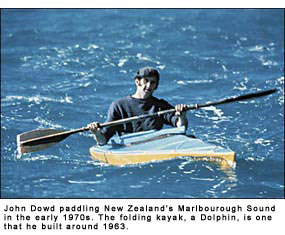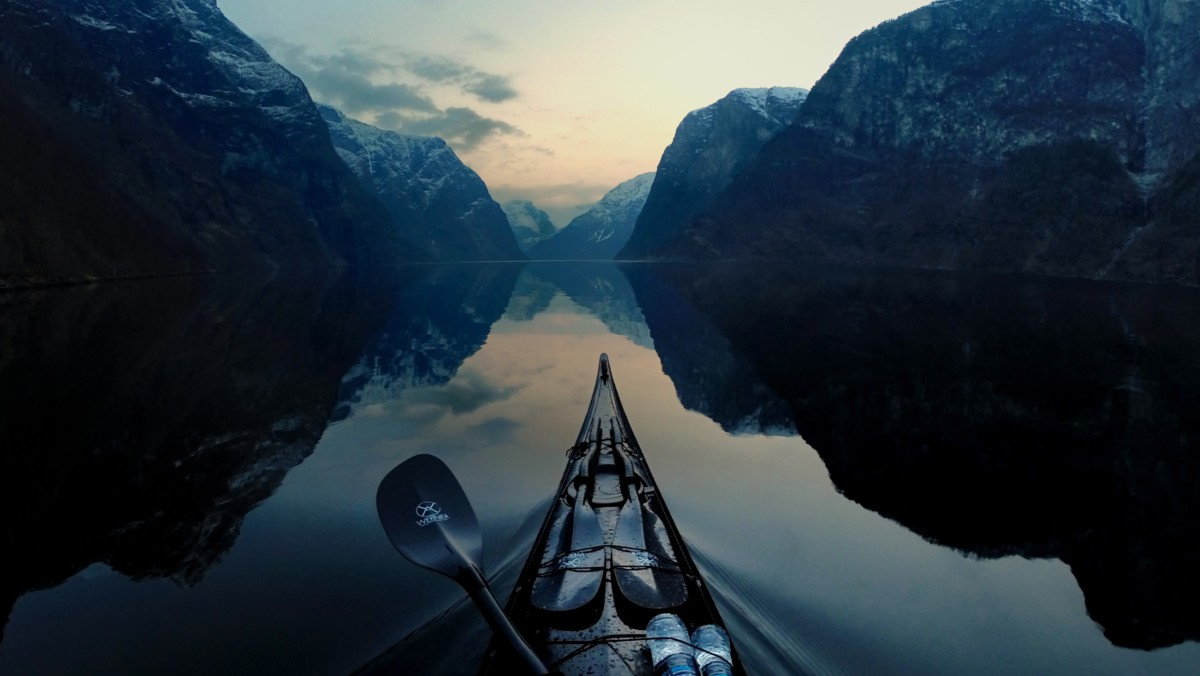 John Dowd is a likable Kiwi with true Bohemian sensibilities and a passion for adventure. He wrote one of sea kayaking’s classic books, Sea Kayaking: A Manual for Long-Distance Touring (Grey-stone Books). Now in its fifth edition, it was the first book to give the name “sea kayaking” to what had been known variously as blue-water paddling, sea canoeing and open-water canoeing.
John Dowd is a likable Kiwi with true Bohemian sensibilities and a passion for adventure. He wrote one of sea kayaking’s classic books, Sea Kayaking: A Manual for Long-Distance Touring (Grey-stone Books). Now in its fifth edition, it was the first book to give the name “sea kayaking” to what had been known variously as blue-water paddling, sea canoeing and open-water canoeing.
Dowd left his native New Zealand in 1967 to embark on a 15-year voyage around the world, kayaking and climbing the far-flung corners of the globe. He paid his way by working as a commercial diver, an Outward Bound instructor, a freelance writer and a photographer. In 1976, during his travels through South America, he met and later married Beatrice, a Canadian who was also a traveler. Bea shared John’s passion for paddling, and in 1977, they paddled from Venezuela to Florida. They eventually settled in the mountains above Vancouver, B.C., and in 1980, founded the first specialty sea-kayaking store there. In 1981, Dowd’s magnum opus Sea Kayaking was published and introduced enthusiasts to seamanship, navigation, reading the weather and the sea, and low-impact environmental paddling.
In 1984, John became the founding editor of Sea Kayaker, the first publication dedicated to the sport. Dowd’s vision for the magazine was “to provide a forum for serious input from knowledgeable paddlers and to serve as a vehicle for the defense of the freedoms and responsibilities of sea kayaking.” He stayed at Sea Kayaker’s editorial helm for five years, moved to Vancouver and, together with Bea as managing editor, they produced the first 21 issues.
In 1989, the Dowds stepped down from their roles with Sea Kayaker, packed up their young family and headed back to the Canadian woods. John, Bea, their daughter, Olympia, and son, Dylan, lived in a log cabin. Dowd wrote a series of children’s books, served as a trustee on the board of the National Outdoor Leadership School, and temporarily chained his nomadic existence to a fence post in rural Canada. Says John of those days, “We had no electricity, we home-schooled our kids and lived an alternative lifestyle on the edge of the city.” But the nomadic impulse would not be put to rest. In the words of Dorothy Parker, “They sicken of the calm, who know the storm.” When Olympia, then 14, was invited to join the Moscow City Ballet as a principal dancer, the Dowds sold everything they owned and headed to Russia, where they lived for a year.
“It was an amazing opportunity for Olympia,” Dowd said. “It was an amazing experience for the whole family.”
Olympia wrote a book about her experiences in Russia called A Young Dancer’s Apprenticeship (Raincoast Books). The family later lived in Italy and Spain before returning to Canada, where John and Bea now make their home.
Dowd’s passion for sea kayaking, and his determination to protect the sport and maintain its freedom from restrictive regulations, forms the fundamental share of his focus these days. Education through experience and the sharing of information, he believes, are the keys to the healthy survival of the sport. While sea kayaking has been a lifelong pursuit for Dowd, he says, “My learning curve now is as steep as it has ever been.” Even now, he doesn’t think of himself as an expert: “If you think you’re an expert, you’ve got an attitude problem.” While sea kayakers can achieve a degree of competence through the acquisition of skills, Dowd believes attitude and judgement are the real keys to safe paddling. “Both can be taught,” says Dowd, “but they are much harder to assess.”
Because he believes skills alone are not a true measure of a paddler’s competence on the water, Dowd is concerned when the emphasis in training focuses on skills simply because they are easier to assess. Trends toward the certification of guides and instructors also concern Dowd. In the latest edition of his book, he writes: “Indeed, a sense of misplaced confidence frequently develops among those who have been certified to teach or guide, since curriculum content often replaces real experience.”
Certification can expand from the industry to the consumer, as it has done in SCUBA diving. He continues: “If we are not vigilant, I can foresee a time when you will need to be certified in order to rent or buy a kayak.”Dowd is presently working on a video series on seamanship for kayakers. In his opinion, educating paddlers is critical to maintaining the freedom sea kayakers now enjoy. “The regulation of sea kayaking would limit its appeal and freedoms,” he says. “Kayaking is all about freedom.”

